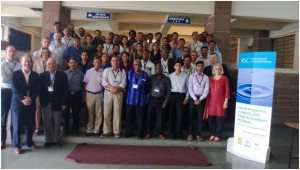27th August 2013 Bangalore, India
Water chemistry bonds researchers
Moreshwar Hude from the Royal Society of Chemistry writes about a two-day workshop titled “Indo UK Water quality perspective: Threats, Technologies and Options” on 13-14 August 2013, which was jointly organized by the UK Science and Innovation Network, Royal Society of Chemistry, UK and the Indian Institute of Science (IISc) Bangalore.
Water is unique and irreplaceable. Yet water is one of the most abused despite the fact that we are well-aware about ill-effects of over exploitation of this limited resource.
According to a recent United Nations report, over 3 million people in the world die of water-contaminated related diseases, which include 1.2 million children. The situation is no different in India. Over one lakh people die of water-borne diseases. The groundwater in one-third of India’s 600 districts is not fit for drinking as the concentration of fluoride, iron, salinity and arsenic exceeds the tolerance levels.
Around 80 per cent of diseases in the developing countries are attributed to poor quality of water supply. There are no simple answers to prevent and treat water contamination. Current technologies are power intensive and costly.
Highlighting these issues and to create awareness about the initiatives world over on water quality, RSC joined hands with IISc and UK’s Science & Innovation Network to host the workshop in Bangalore earlier this month. We were overwhelmed by the response as the workshop was well attended and attracted over 150 delegates working in different aspects of water quality – researchers, policy-makers, funding agencies, industry and non-government sector.
An eclectic group of researchers and scientists from the UK, India, Ireland, Canada, Africa who are working in areas related to water quality, presented scientific papers on topics such as water quality issues – urban and rural; emerging pollutants, water purification options; health and water quality; waste water management and water quality management.
Dr Alejandra Palermo, Manager, International Development, RSC and Prof. Sudhakar Rao and Prof. Sekhar Muddu, Department of Civil Engineering, IISc, hoped that this event would be the first step in establishing and building strong research links between UK, India and African countries to address global issues of water security, quality, and health.
There were fascinating presentations on cutting-edge technologies for water purification to make water affordable to people – as low as 5 paise per litre.
After scientific deliberations, a roundtable discussion on water quality involving academia, industry representatives and policy makers was held in an effort to develop a report on potential areas for cooperation and collaboration between the UK and India. Representatives from Shell Technology Centre in Bangalore, Unilever, Indian Department of Science & Technology (DST), Arghyam, a Bangalore-based NGO working in water related advocacy initiatives, offered their inputs for the proposed report.
Mr Ian Felton, British Deputy High Commissioner, who opened the roundtable discussions, said that water supply and security has been identified as one of the key thematic priorities in the third Indo-UK Science and Innovation Council held in London during April 2012 and hoped the deliberations would offer opportunities for research collaborations between India and the UK.
Dr Sanjay Bajpai from the Indian DST, appreciated RSC’s efforts in putting together this workshop on water quality and said it was well timed. He also pointed out that the Indian Department of Science and Technology had launched several initiatives to address challenges of water quality in India and would welcome opportunities for collaboration from the UK.
Going forward, we are hoping that several joint research collaborations and academic exchanges between UK and India and a policy level dialogue will be held between the two countries in addressing global challenges on water security.

1 comment on “Water chemistry bonds researchers”
Comments are closed.